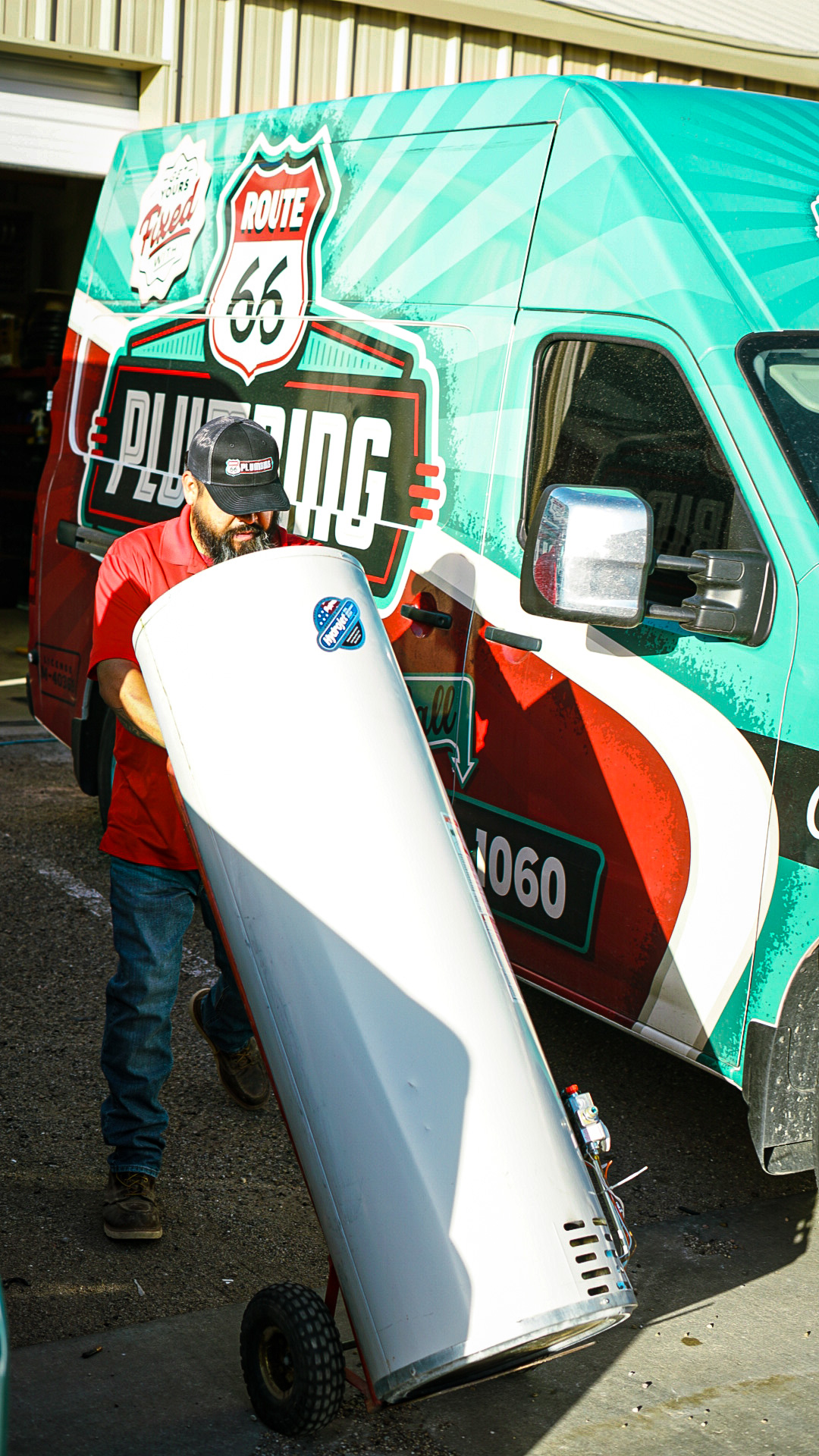Most Common Reasons for Hot Water Heater Leaks
Hot water heaters are essential appliances in most homes, providing the comfort and convenience of warm water for showers, cleaning, and other daily tasks. However, like any other household appliance, they can develop issues over time, with leaks being one of the most common and potentially serious problems. A leaking water heater can lead to significant damage if not addressed promptly. Route 66 Plumbing will explore the most common reasons for Hot Water Heater Services and leaks, how to identify them, and what you can do to prevent or repair them.
Corrosion of the Tank
One of the most frequent causes of hot water heater leaks is corrosion of the tank itself. Over time, the inner lining of the tank, which is typically made of glass or metal, can deteriorate due to constant exposure to water and minerals. Once the protective lining is compromised, the metal tank begins to corrode, leading to leaks.
Signs of Corrosion:
- Rusty water coming from your hot water taps.
- Visible rust or discoloration on the exterior of the tank.
- Water pooling around the base of the heater.
Prevention:
- Regularly check the anode rod, which is designed to attract corrosive elements and protect the tank. Replacing it every few years can extend the life of your water heater.
- Consider a Water Softener Installation if you have hard water, as this can reduce the buildup of minerals that contribute to corrosion.
Faulty Temperature and Pressure (T&P) Relief Valve
The temperature and pressure (T&P) relief valve is a crucial safety component of your hot water heater. It is designed to release water if the temperature or pressure inside the tank becomes too high, preventing the tank from exploding. However, if the valve is faulty or incorrectly set, it can cause leaks.
Signs of a Faulty T&P Valve:
- Water leaking from the pipe connected to the T&P valve.
- Constant dripping or discharge from the valve.
- A high-pitched whistling noise coming from the valve area.
Prevention:
- Regularly test the T&P valve by lifting the lever and allowing it to snap back. Water should flow from the discharge pipe. If it doesn’t, the valve may need replacement.
- Ensure the temperature on the thermostat is set correctly to avoid unnecessary pressure buildup.
Loose or Damaged Plumbing Connections
Another common source of leaks in hot water heaters is loose or damaged plumbing connections. These connections can wear out over time due to the constant flow of water, temperature fluctuations, and general wear and tear.
Signs of Loose or Damaged Connections:
- Water dripping from the inlet or outlet pipes.
- Water stains or puddles around the connection points.
- A hissing sound near the connections.
Prevention:
- Regularly inspect the connections for any signs of wear, rust, or leaks.
- Tighten loose connections with a wrench, but be careful not to overtighten, as this can cause damage.
- Replace any worn-out or damaged parts promptly.
Cracked or Broken Drain Valve
The drain valve is located near the bottom of the hot water heater and is used to drain the tank for maintenance or replacement. Over time, the valve can crack or become damaged, leading to leaks.
Signs of a Faulty Drain Valve:
- Water leaking from the bottom of the tank.
- Difficulty in turning the valve on or off.
- Visible cracks or damage on the valve.
Prevention:
- Avoid overtightening the valve when draining the tank.
- Regularly inspect the valve for any signs of damage or wear.
- If the valve is leaking, replace it immediately with a high-quality brass valve, which is more durable than plastic.
Sediment Buildup
Sediment buildup inside the tank is another common reason for hot water heater leaks. Over time, minerals and debris from the water supply can settle at the bottom of the tank. This buildup can cause the tank to overheat, leading to damage and potential leaks.
Signs of Sediment Buildup:
- Popping or rumbling noises from the tank.
- Reduced efficiency in heating water.
- Water discoloration or particles in the water.
Prevention:
- Flush your hot water heater regularly to remove sediment. This should be done at least once a year.
- Consider installing a water filtration system to reduce the amount of sediment entering the tank.
Aging Water Heater
Hot water heaters typically have a lifespan of 8 to 12 years. As they age, the likelihood of leaks and other issues increases. If your water heater is nearing the end of its lifespan, leaks may become more frequent as components wear out and the tank weakens.
Signs of an Aging Water Heater:
- Frequent leaks or other issues.
- A noticeable decrease in hot water supply.
- The tank takes longer to heat water.
Prevention:
- Regular maintenance can extend the life of your water heater, but eventually, replacement is the best option.
- Keep track of the age of your water heater and plan for a replacement when it nears the end of its expected lifespan.
High Water Pressure
High water pressure can cause stress on the hot water heater tank and its components, leading to leaks. If the pressure is too high, the tank may expand, causing joints and connections to weaken or fail.
Signs of High Water Pressure:
- Water spurting from faucets when turned on.
- Frequent leaks from the hot water heater.
- A loud banging noise in the pipes (water hammer).
Prevention:
- Install a pressure-reducing valve (PRV) if your water pressure is consistently above 80 psi.
- Regularly check the water pressure in your home using a pressure gauge.
- Ensure the expansion tank (if you have one) is properly charged to absorb excess pressure.
Thermal Expansion
Thermal expansion occurs when water is heated and expands, increasing the pressure inside the tank. If the pressure becomes too high, it can cause leaks in the tank or plumbing connections.
Signs of Thermal Expansion:
- Water dripping from the T&P relief valve.
- Bulging or warping of the tank.
- Increased water pressure in the system.
Prevention:
- Install an expansion tank to absorb the increased pressure caused by thermal expansion.
- Regularly check the pressure in the expansion tank and recharge it if necessary.
Environmental Factors
Sometimes, external environmental factors can contribute to hot water heater leaks. For example, in areas prone to earthquakes, the movement can cause the tank to shift or connections to loosen, leading to leaks.
Signs of Environmental Impact:
- Unexplained leaks following a seismic event.
- Visible movement or tilting of the water heater.
- Cracks in the surrounding floor or walls.
Prevention:
- Secure your hot water heater with seismic straps if you live in an earthquake-prone area.
- Ensure the heater is installed on a stable, level surface.
- Regularly inspect the area around the heater for signs of movement or damage.
Conclusion
Hot water heater leaks can be a significant inconvenience and can lead to costly repairs if not addressed promptly. By understanding the common causes of leaks, you can take proactive steps to prevent them and extend the life of your hot water heater. Regular maintenance, including inspections and timely repairs, is crucial in ensuring your water heater operates efficiently and safely for years to come. If you notice any signs of a leak, it’s essential to act quickly to avoid further damage and ensure the continued comfort of your home.
Frequently Asked Question
What should I do if my hot water heater is leaking?
If you notice a leak, the first step is to turn off the power supply to the heater. For electric heaters, turn off the breaker at your electrical panel, and for gas heaters, turn the gas valve to the “off” position. Next, turn off the water supply to the heater to prevent further leaking. Once the leak is contained, inspect the source of the leak or contact a professional plumber to diagnose and repair the issue.
Can I fix a leaking hot water heater myself?
Some minor leaks, such as those from loose connections or a faulty valve, can be fixed by tightening the connection or replacing the valve. However, more serious issues, such as a corroded tank or significant sediment buildup, typically require professional repair or replacement. Always exercise caution and consult a professional if you’re unsure.
Is it normal for my hot water heater to make noise?
Some noise, such as a slight hum or clicking when the heater is operating, is normal. However, loud popping, rumbling, or banging noises often indicate sediment buildup or high water pressure. Regularly flushing the tank and maintaining proper water pressure can help reduce or eliminate these noises.





